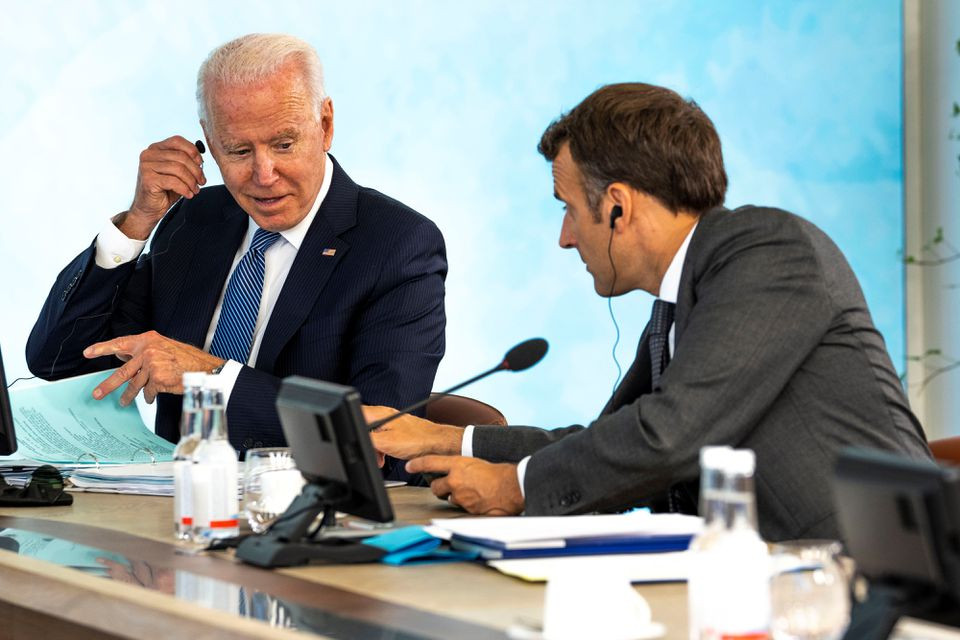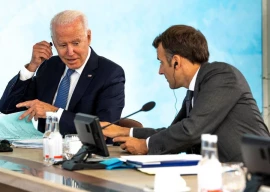
Australia's decision to break off a multi-billion US dollar submarine contract with France inked in 2016 and turn to the United States and Britain for nuclear-powered alternatives has sparked an outcry from the European continent.
The United States, Britain and Australia announced Wednesday a new security partnership, dubbed "AUKUS" (Australia-UK-US), under which the first initiative is the delivery of a nuclear-powered submarine fleet to Australia by the other two.
France has decided to recall its ambassadors to the United States and Australia for consultations on Friday.
"We had established a relationship of trust with Australia. This trust has been betrayed," French Minister of Europe and Foreign Affairs Jean-Yves Le Drian said on Thursday, calling the trilateral deal a "stab in the back".
The trilateral move may lead to new rifts among the transatlantic allies while the international community has voiced concerns over nuclear proliferation.
Betrayed ally
"At the request of the President of the Republic, I decided to immediately recall to Paris for consultations our two ambassadors in the United States and Australia. This exceptional decision is justified by the exceptional seriousness of the announcements made on Sept 15 by Australia and the United States," Le Drian said in a statement on Friday.
French media said it was the first time in France's history that such a decision was taken vis-a-vis the two countries.
The sudden end to the once biggest defence contract in Australia's history has reminded the French of the whims of the last US administration. "The American behaviour worries me; this unilateral and brutal decision is very similar to what (former US president) Mr (Donald) Trump was doing," Le Drian said.
Public sparring between Trump and his French counterpart, Emmanuel Macron, was not unusual on topics ranging from military spending, trade to climate change and regional issues.
"The American decision, which leads to the exclusion of a European ally and partner like France from a crucial partnership with Australia ... signals a lack of consistency which France can only notice and regret," Le Drian and French Minister of the Armed Forces Florence Parly said in a joint statement issued on Wednesday.
"America is back!" US President Joe Biden repeated the slogan several times to amend cracks across the Atlantic, from his first stop in Britain for the Group of Seven summit to the North Atlantic Treaty Organisation and US-European Union summits in Brussels in June.
Trade talks in doubts
Earlier on Friday, France's Secretary of State for European Affairs Clement Beaune said France cannot trust Australia in its ongoing trade talks with the European Union (EU) after the AUKUS partnership was unveiled.
"We're having trade negotiations with Australia," Beaune told France 24 news channel. "I don't see how we can trust our Australian partners."
The EU and Australia started negotiations for a free trade agreement in 2018 and have been conducting their trade and economic relations under the 2008 EU-Australian Partnership Framework.
The two sides have completed 11 rounds of talks and the next round is set for autumn this year.
Australia was the EU's 19th largest trading partner in 2020, and the EU was Australia's third-largest after China and Japan, followed by the United States, according to EU data.
Nuclear proliferation concerned
The International Atomic Energy Agency (IAEA), a global nuclear watchdog, has voiced concern amid international worries about the proliferation of nuclear materials and technologies in response to the trilateral deal.
"The IAEA will engage with them (Australia, the United States and Britain) on this matter in line with its statutory mandate, and in accordance with their respective safeguards agreements with the Agency," it said in a statement on Thursday.
The United States and Britain, both nuclear-weapon states, are state parties to the Treaty on the Non-Proliferation of Nuclear Weapons, which prevents the proliferation of nuclear weapons and technologies.
China on Thursday voiced opposition to the trilateral move, describing it as a "sheer act of nuclear proliferation."
The United States and Britain "will apparently give rise to the proliferation of nuclear materials and technologies by openly providing assistance to Australia, as a non-nuclear weapon state, in the latter's acquisition and building of the nuclear-powered submarine," said Wang Qun, Chinese envoy to the United Nations and other international organizations in Vienna.
"Such an act of nuclear proliferation will give rise to serious negative implications on the ongoing international efforts to address the nuclear issue on the Korean Peninsula as well as the Iranian nuclear issue," he said.
New Zealand confirmed that Australian nuclear submarines will be banned from its waters and will continue its nuclear-free stance.
"New Zealand's position in relation to the prohibition of nuclear-powered vessels in our waters remains unchanged," the country's Prime Minister Jacinda Ardern told local news outlet NewsHub on Thursday.
"As the world is moving towards making these weapons illegal, this is the wrong direction at the wrong time," The Guardian quoted Gem Romuld, Australia director of the Nobel Peace Prize-winning group the International Campaign to Abolish Nuclear Weapons, as saying.





1732618327-2/Untitled-design-(7)1732618327-2-270x192.webp)














COMMENTS
Comments are moderated and generally will be posted if they are on-topic and not abusive.
For more information, please see our Comments FAQ